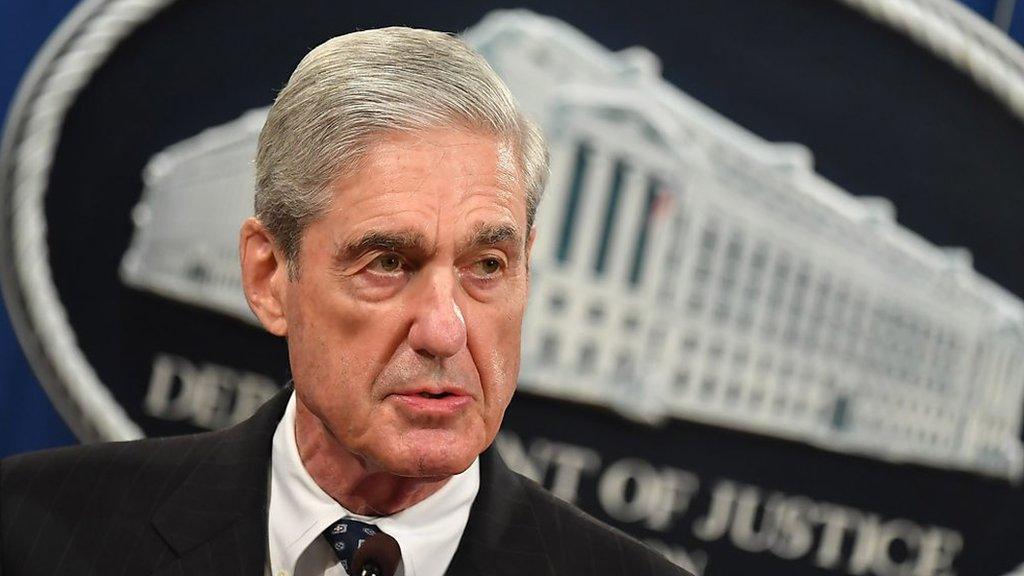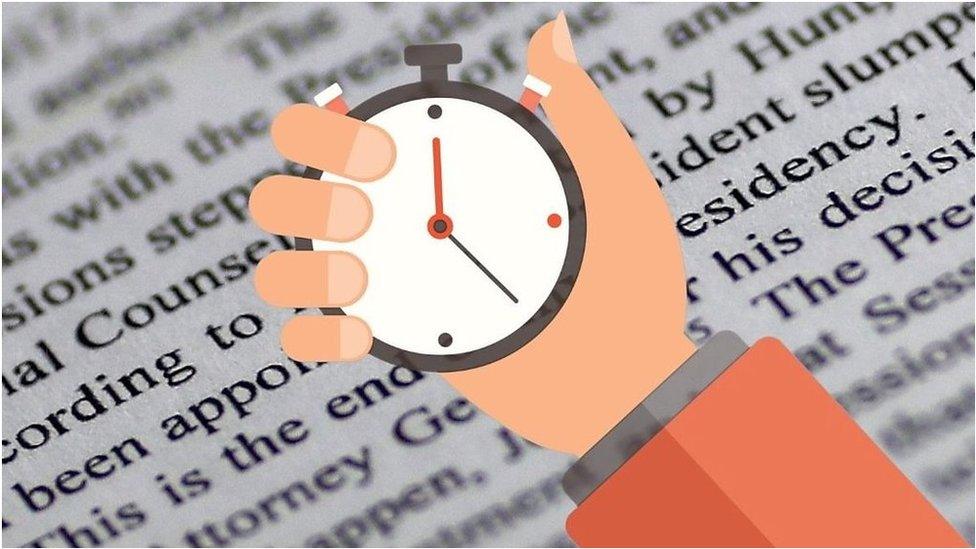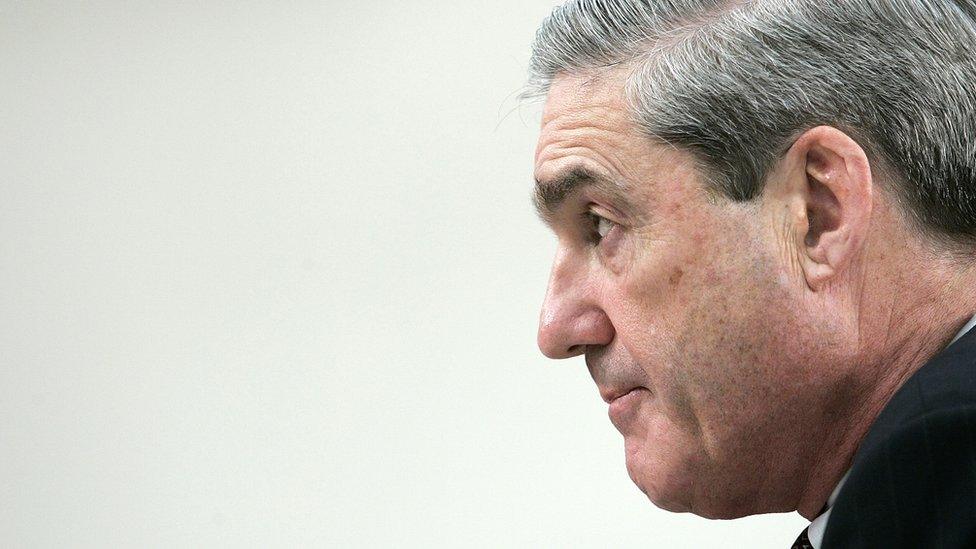More Democrats call for impeachment after Mueller makes statement
- Published
Robert Mueller: No confidence that there was no crime
Three more prominent US Democrats have called for the impeachment of President Trump, after Special Counsel Robert Mueller made his first public remarks.
Speaking on Wednesday, Mr Mueller said his investigation had not exonerated Mr Trump of obstruction of justice, contradicting the president's claims.
Mr Mueller was tasked with investigating Russian interference in the 2016 presidential election.
He said charging a sitting president with a crime was not an option.
The issue of impeachment has divided the Democratic Party, pitting a growing number of lawmakers against Nancy Pelosi, the speaker of the house and the most senior Democrat. Ms Pelosi has so far resisted the idea, arguing that it would be counter-productive.
But Mr Mueller's remarks prompted three leading Democratic presidential hopefuls to join the chorus calling for impeachment, bringing the total to 10 of 23 declared candidates.
At the White House on Thursday morning, Mr Trump said Mr Mueller was "a totally conflicted person" and a "true Never Trumper", referring to his Republican critics in the 2016 White House race.
He also said impeachment was a "dirty, filthy disgusting word" and the inquiry was "a giant presidential harassment".
Who is calling for impeachment?
In response to Mr Mueller's remarks, Democratic candidates Cory Booker, Kirsten Gillibrand and Pete Buttigieg publicly advocated for the first time for impeachment.
"Congress has a legal and moral obligation to begin impeachment proceedings immediately," said Mr Booker, a senator from New Jersey.
New York Senator Ms Gillibrand said it was "time for Republicans and Democrats to begin impeachment hearings and follow the facts wherever they may lead".
Indiana mayor Pete Buttigieg tweeted: "This is as close to an impeachment referral as it gets."
Allow X content?
This article contains content provided by X. We ask for your permission before anything is loaded, as they may be using cookies and other technologies. You may want to read X’s cookie policy, external and privacy policy, external before accepting. To view this content choose ‘accept and continue’.

Other senators reiterated earlier calls for impeachment. "It is up to Congress to hold this president accountable. We need to start impeachment proceedings," said California senator Kamala Harris.
Vermont senator Bernie Sanders stopped short of endorsing proceedings, external, but said in an Instagram post: "If the House Judiciary Committee deems it necessary, I will support their decision to open an impeachment inquiry."
Responding to Mr Mueller's statement, House Speaker Ms Pelosi said: "The Congress holds sacred its constitutional responsibility to investigate and hold the President accountable for his abuse of power."
How did Republicans react?
Mr Trump said on Twitter there was "insufficient evidence" against him, "and therefore, in our Country, a person is innocent".
Allow X content?
This article contains content provided by X. We ask for your permission before anything is loaded, as they may be using cookies and other technologies. You may want to read X’s cookie policy, external and privacy policy, external before accepting. To view this content choose ‘accept and continue’.

Representative Doug Collins, the most senior Republican on the House Judiciary Committee, said that "reinvestigating the special counsel's findings" would "only further divide our country".
The first Republican congressman to call for Mr Trump's impeachment, Representative Justin Amash, said: "The ball is in our court, Congress."
Meanwhile, White House Press Secretary Sarah Sanders said: "After two years, the Special Counsel is moving on with his life, and everyone else should do the same."
What did Mueller say?
Mr Mueller largely reaffirmed what was in his report, which was released last month to the public, with substantial redactions.
He detailed 10 instances where Mr Trump had possibly attempted to impede the investigation, but said that charging the president with a crime was not an option for the special counsel.
"The Constitution requires a process other than the criminal justice system to formally accuse a sitting president of wrongdoing," he said, in what was seen as a reference to the ability of Congress to start an impeachment process.
Why no charge of obstruction of justice? A law professor breaks down the legal questions
He said that if his team had had confidence that Mr Trump "clearly did not commit a crime, we would have said so".
Mr Mueller said he did not believe it was "appropriate to speak further" about the investigation and that he would not provide any information that was not in his team's report.
With Democratic lawmakers seeking to have him testify in Congress, Mr Mueller said: "The report is my testimony."
He also announced the formal closure of the special counsel office and his resignation from the justice department to return to private life.


Robert Mueller didn't break much new ground in his eight-minute statement announcing the official end of the special counsel investigation. Instead, he highlighted in bold what he views as the key points of nearly two years of work.
Mr Mueller started and ended by emphasising that America during the 2016 election was under attack by malign foreign actors. He said those allegations deserve the attention of every American.
In the portion of his investigation into possible ties between Russia and the Trump campaign, Mr Mueller said there was "insufficient evidence to charge a broader conspiracy" - hardly the complete vindication the president asserts.
When it comes to obstruction of justice, he chipped away further at the president's defences. Mr Trump wasn't exonerated, "charging the president" wasn't an option. If Mr Mueller has his way, his role in this drama is at an end. His report speaks for itself, he said, and he wouldn't engage in "conclusions or hypotheticals about the president".
That may not be enough for Democrats in Congress, who still want to question Mr Mueller in person. If Mr Mueller is to be believed, however, all they need to know - all he will offer them - is written in the pages of his report.
The Mueller report - in 60 seconds
- Published29 May 2019

- Published18 April 2019

- Published23 July 2019
